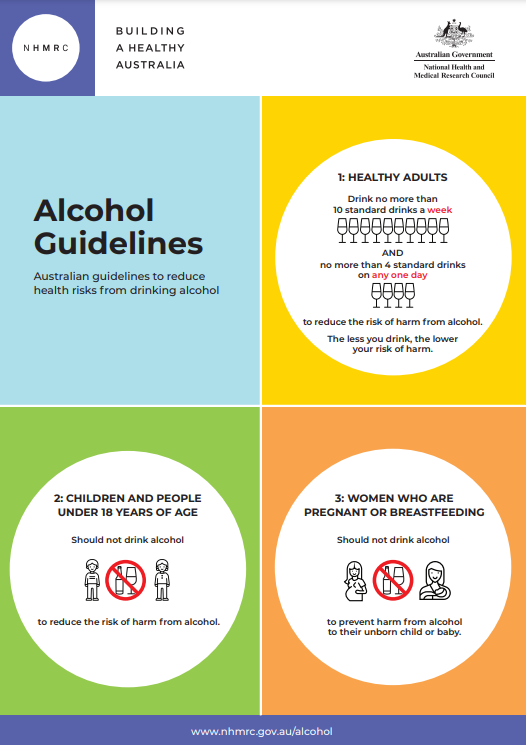Alcohol – know the risks

Alcohol affects everyone differently – so how you react may be completely different from your friends. Sometimes these effects are only temporary, but drinking can have negative short- and long-term consequences. It’s important you know how alcohol affects your body, the risks involved and what you can do to reduce these risks.
What factors influence how alcohol is processed in your body?
Alcohol is absorbed directly into your bloodstream through the walls of your stomach and small intestine. It’s then rapidly distributed to all parts of your body, including your brain.
Eating food when you drink alcohol, can slow the absorption of alcohol into your bloodstream. This may mean you don’t feel the effects of alcohol as quickly.
The main organ responsible for removing alcohol from your body is your liver. It generally takes about one hour for your liver to break down the alcohol in one standard drink.
Having coffee or taking a cold shower after drinking won’t help remove the alcohol from your system any faster. That’s why if you’re choosing to drink alcohol, it’s important to pace yourself.
Your body metabolises (breaks down) alcohol using several pathways. The most common pathway involves two enzymes — alcohol dehydrogenase (ADH) and aldehyde dehydrogenase (ALDH). These enzymes help break apart the alcohol molecule, making it possible for your body to get rid of it.
ADH breaks down alcohol to acetaldehyde (a toxic substance), before converting it to acetate (a less active by product). The acetate is then broken down into water and carbon dioxide which is how it leaves your body.
Age
Your ability to tolerate alcohol changes as you get older. This can mean a higher blood alcohol concentration (BAC) when you drink, due to:
- a lower muscle mass
- a lower amount of body water
- slower processing of alcohol by your liver (this means that alcohol stays in your liver longer and increases the chance of liver damage).
There are also more potential complications to consider, such as:
- a higher likelihood of accidents
- potential medication interaction(s) – if you take over-the-counter or prescription medicines, you should always check with your doctor before drinking due to the possibility of side effects.
Other physical and mental factors
The amount of fat or muscle you have – alcohol is diluted more in a person with more muscle tissue.
Amount of food in your stomach – food slows the absorption of alcohol into your bloodstream, which can reduce the speed at which it affects your body.
Your sex – females can have less of the enzyme alcohol dehydrogenase, leading to slower alcohol metabolism. Hormonal differences and body composition also play a role.
Genetic factors – some people have alcohol intolerance because the enzyme aldehyde dehydrogenase 2 (ALDH2) is less active. This means that your body is less efficient in converting acetaldehyde into acetic acid.
Overall physical health, including liver and kidney function, which influences alcohol metabolism.
Mental health and emotional state.
Other medications and drugs in your system – medications that are known to interact with alcohol include anti-anxiety medicines, antibiotics, antidepressants, antihistamines, blood thinners and diabetes medicines.
Factors relating to drinking alcohol
- How fast you drink – the faster you drink, the quicker alcohol gets into your bloodstream.
- Drinking history – alcohol can be addictive and for those with a history of problematic alcohol use, it can be difficult to moderate consumption.
- Additives or other substances in alcoholic beverages can affect how alcohol is processed and its effects.
Additional Factors to Consider:
- Hydration level: dehydration can affect alcohol metabolism and its effects on your body.
- Sleep and fatigue: lack of sleep or fatigue can alter the effects of alcohol and impair your judgment.
- Ethnicity: certain ethnic groups have different levels of the enzymes that metabolise alcohol – this affects your tolerance and reaction to alcohol.
Studies continue to increase our understanding of the long-term impacts of alcohol on the body systems, including the brain and cardiovascular system.
What are the risks involved with alcohol?
There are both short- and long-term effects of drinking alcohol. It’s important to know the potential risks when you consume alcohol.
- Nausea and vomiting
- Headache
- Flushed appearance
- Slower reflexes
- Lack of co-ordination
- Loss of inhibitions and a false sense of confidence
- Slurred speech
- Blurred vision
- Reduced concentration
- Intense moods (aggression, elation, depression)
- Blackouts
- Disrupted sleep
- Injuries/death associated with falls, accidents, violence and intentional self-harm
- Alcohol poisoning which can lead to a coma and death.
- Concentration and long-term memory problems
- Poor work performance
- Legal and financial difficulties
- Family and relationship problems
- Poor nutrition
- Alcohol-related brain injury
- Alcohol dependency
- Cancers – including cancer of the mouth, pharynx, larynx, oesophagus, bowel and breast
- Cirrhosis and liver failure
- Heart and vascular diseases including hypertension (high blood pressure), heart failure and stroke
- Skin problems
- Stomach problems
- Problems with the nerves in your arms and legs
- Seizures from alcohol withdrawal
- Sexual and reproductive problems (such as impotence and fertility problems)
- Fetal alcohol spectrum disorder (FASD) (if drinking while pregnant).
What is binge drinking and what are the effects?
Binge drinking is when you drink an excessive amount of alcohol in a short period. This behaviour can take various forms, such as:
- drinking heavily over several days or weeks
- sporadic episodes of intense drinking
- drinking alcohol with the intention of getting drunk.
There are many risks associated with binge drinking. They include:
- Impaired memory: difficulty in recalling recent events or forming new memories.
- Personal injury or harm to others: increased likelihood of accidents and injuries due to impaired judgment and coordination.
- Disorientation and loss of balance: dizziness and problems with physical coordination.
- Gastrointestinal issues: stomach upset, including diarrhoea and vomiting.
- Compromised decision-making: reduced ability to make sound judgments, leading to risky behaviours.
- Risk of alcohol poisoning: a severe and potentially life-threatening condition caused by high levels of alcohol in the bloodstream.
Understanding the serious nature of these risks is crucial in recognising the dangers of excessive alcohol consumption and understanding the importance of responsible drinking if choosing to consuming alcohol.
What can you do to reduce the risks?
While alcohol affects each of us differently, there are steps you can take to moderate your drinking.
Simple things you can do:
Have a drink of water before having an alcoholic drink.
Set yourself limits and stick to them.
Alternate between alcoholic and non-alcoholic drinks, such as having a glass of water in between alcoholic drinks.
Drink slowly. On average, it takes one hour to metabolise one standard drink.
Try drinks with a lower alcohol content. Try swapping out higher-strength alcoholic drinks with a lower-strength alcoholic drinks.
Have something to eat before or while you have an alcoholic drink.
Dilute your alcoholic drink by adding water or ice.
Drinking responsibly is about drinking in moderation.
The National Health and Medical Research Council (NHMRC) recommends:
- Healthy men and women should drink no more than 10 standard drinks a week and no more than four standard drinks on any one day.
- Children and people under 18 years of age should not drink alcohol.
- Women who are pregnant or planning a pregnancy should not drink alcohol to prevent alcohol harming their unborn child.
- For women who are breastfeeding, not drinking alcohol is safest for their baby.



 Audio
Audio Video
Video



